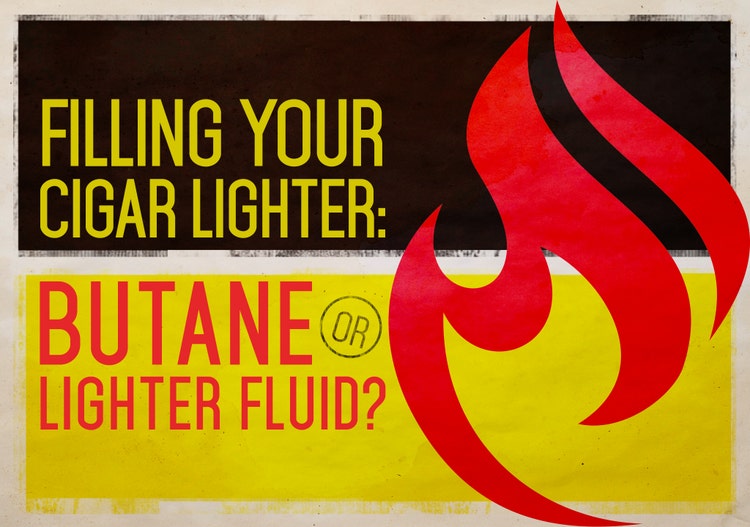
How to light a cigar with butane and lighter fluid
Why is it cigar smokers seem to find themselves facing choices like band on or band off; cello on or cello off; smoking your cigars right away or letting them age? Here’s another one for you. Butane or lighter fluid? Of course, it always comes down to personal preference, just like some cigar lovers prefer light Connecticut wrappers over dark Maduro wrappers. There’s no right or wrong with regard to any of these things.
So, is there a difference between how to light a cigar with a butane lighter or a lighter that uses Zippo lighter fluid? Nope, the technique itself is the same. The main difference is the type of flame. Lighters like Zippo® and others that use liquid fuel produce a “soft flame.” This is the kind of flame you would ordinarily get from a match or a candle. Since a soft flame is not as hot as a butane flame, it may take a little longer to toast and light your cigar; that is, unless you happen to smoke small cigars. Most cigar lighters use butane fluid (actually liquid gas), because it burns hotter, the flame is concentrated into a powerful, wind-resistant torch, and it is much cleaner. (Note that butane lighters with soft flames like the disposable Bic® type and refillable butane lighters are similar to matches, except the flame will remain lit longer.)
When using a soft flame lighter, you want to hold the flame so that the top, or white part of the flame is flickering just below the foot of the cigar. Remember, you don’t want the flame to touch the tobacco. It will give off enough heat to satisfactorily toast your cigar. The only difference is when you’re outside. If there’s a breeze, the flame will move, which makes it harder to get the cigar toasted evenly and quickly. The actual lighting phase is a bit easier, because the foot is already hot and the cigar should take pretty well to the soft flame.
As for lighting cigars with torch lighters that take butane fuel, because the heat is so much more intense and focused, you may have to hold the flame a bit further away from the cigar’s foot during the toasting phase; otherwise you may wind up with a barbequed cigar. When lighting, you want to keep the flame close enough to puff out some good smoke, yet far enough so that you don’t scorch the tobaccos. Even the best butane lighter will ruin your cigar if it’s not used with care.
Cigar expert Gary Korb shows you how to properly use butane and lighter fluid when filling your lighter.
Surprisingly, a lot of cigar smokers still use soft flame lighters that require lighter fluid. Perhaps it’s because the lighter is a family heirloom, or they like the lighter because of its design (Zippo® does make some very cool lighters), or they’ve developed a great technique for lighting their cigars with a soft flame over time.
One reason many cigar smokers have avoided lighter fluid is because it has a strong odor. Apparently, the odor from the lighter fluid can work its way into the aroma of the cigar, and no one wants their cigar to smell like an oil refinery. However, Zippo® and other lighter fluid manufacturers have come up with formulas that are virtually odor-free. I own a couple of Zippo® lighters and their odorless lighter fluid lives up to its name.
Finally, if you’re like most cigar smokers, you probably own a number of cigar lighters. So, when it comes to the best cigar lighters, whether they require butane fluid or lighter fluid, it all comes down to your comfort level, and if the result is a cigar that lights well and satisfies you, then whatever means it took to get there is justified.
Zippo® is a registered trademark of Zippo Manufacturing Company, Bradford, PA
Bic® is a registered trademark of BIC USA, Inc